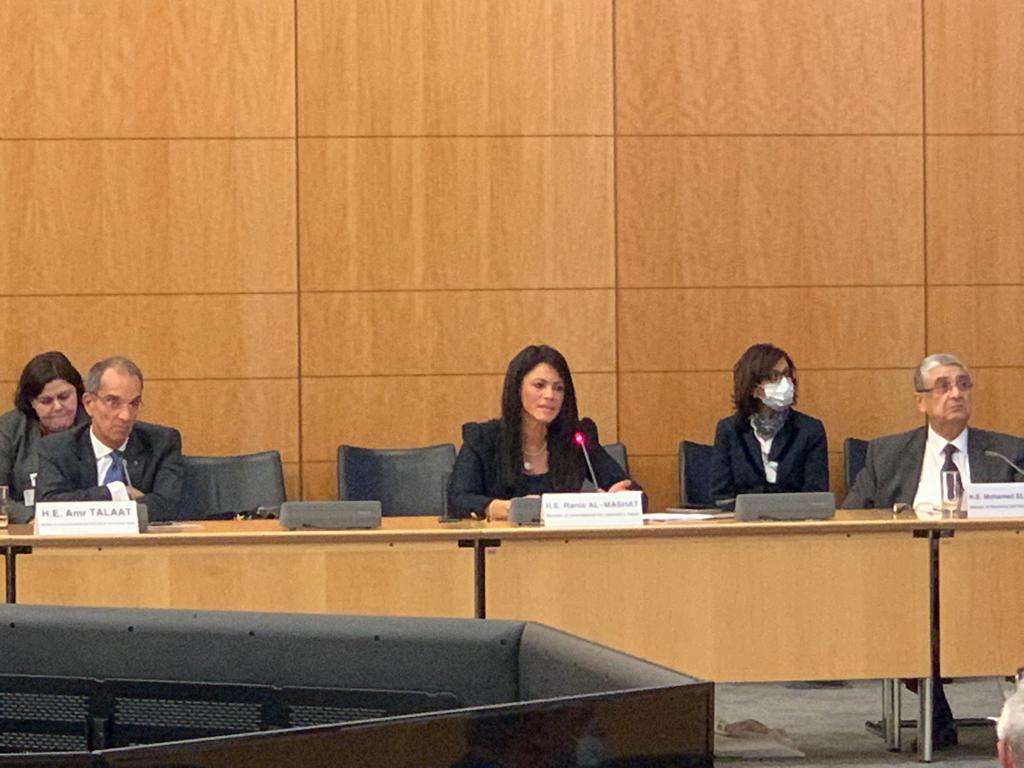Egypt's Minister of International Cooperation Rania A. Al-Mashat insisted that political leadership is keen on establishing governance and transparency on all levels of the government’s efforts to implement homegrown programs that achieve United Nations Sustainable Development Goals (SDGs).
In a statement, Al-Mashat, who is on an official visit to Paris since Sunday, said that governance accelerates the pace of achieving the Sustainable Development Goals (SDGs), adding that the follow-up and evaluation systems of the Ministry of International Cooperation are substantial for achieving transparency and coordinating between stakeholders; noting that governance was the most common pillar among the Ministry’s principles of Economic Diplomacy, through which the Ministry works towards in order to achieve Egypt’s Vision 2030.
“Political leadership is keen on establishing principles of governance and transparency on all levels of the government’s efforts, in order to implement homegrown programs that achieve sustainable development.”
Al-Mashat made this remark during a high-level discussion on economic reforms in Egypt on the governance of sustainable development, held at the Organisation for Economic Co-operation and Development (OECD), as part of the Prime Minister, Dr. Mostafa Madbouly’s visit to France, along with the accompanying delegation from the Government of Egypt.
Moreover, the minister elaborated that the Government of Egypt, in cooperation with the OECD, implemented the framework for evaluating the global partnership for effective development cooperation, through which the priorities for cooperation with bilateral and multilateral development partners were identified.
In accordance with the directives of President Abdel Fattah El-Sisi, the President of the Arab Republic of Egypt, to enhance development cooperation with international institutions, the Government of Egypt has made strides in governing international partnerships, as the Ministry of International Cooperation has launched Multi-Stakeholder Platform (MSP) in 2020, which presents governance of development cooperation through bringing all stakeholders to one decision-making table and to bolster cooperation across various sectors.
This is in addition to exchanging views on the achievements, challenges, and future priorities that pave the way for integrating development partners’ efforts in pushing forward the global 2030 agenda.
The minister also revealed that over 2020 and 2021, the Ministry has launched a number of MSPs across different sectors, such as health, Information and Communications Technology (ICT), petroleum, Small and Medium-sized Enterprises (SMEs), and food and supply, etc; noting that all the MSPs have witnessed effective participation from various stakeholders, including the private sector, which is a key main partner in achieving economic development across Egypt.
The minister noted that this aligns with the efforts of the government’s economic and structural reforms that would enhance the private sector’s engagement in development.
In the same connection, Al-Mashat added that Egypt has a strategic partnership with the OECD to assess the impact of the private sector's contribution to development through international partnerships, and to address means of boosting its engagement in development.
Highlighting the Ministry of International Cooperation’s role in governing SDGs financing the minister stated that through the second principle of Economic Diplomacy: the ODA SDG Mapping Framework for all projects with multilateral and bilateral development partners to make sure that all projects reinstate the sustainability ethos; as the map showcases the Ministry of International Cooperation’s portfolio of projects with the detailed allocation of the $25 billion development financing across the 377 projects.
Al-Mashat added that the ODA SDG Mapping significantly represents the bilateral and multilateral development partners’ efforts in achieving sustainable development, and contributes to defining future priorities that align with the SDGs as well as Egypt’s Vision 2030.
Furthermore, she mentioned that the ODA-SDG Mapping was documented in the recently launched book titled: “Stakeholder Engagement Through Economic Diplomacy”, published by the London School of Economics, which reviews the efforts undertaken by the Ministry to launch an institutional framework for economic diplomacy to bring together the stakeholders involved, to push towards the achievement of the SDGs.
Within the framework of the principles of governance and transparency, Al-Mashat referred to the third principle of Economic Diplomacy, which is adopting a consistent Global Partnerships Narrative that puts People at the Core through Projects in Action, with Purpose as the Driver; adding that the Ministry of International Cooperation’s follow-up and evaluation processes, in coordination with relevant authorities, implements an inclusive system of transparency, accountability, and governance, in order to track development funds directed to achieve the SDGs.
This is in addition to monitoring national agencies that benefit from foreign development financing within the framework of the general economic policy of the country to achieve national development priorities.
The minister concluded by emphasizing the importance of creating new innovative SDGs financing tools for supporting the national efforts through blended financing and new financing tools, to ensure the achievement of SDGs, noting that Egypt has made strides in that vein, as Egypt sold $750 million in green bonds in what was the region’s first sovereign offering of climate-friendly securities, where at the meantime, Egypt is working to obtain green Islamic development financing.
Lately, Al-Mashat has held a roundtable discussion with the Vice-Chairman, Corporate and Investment Banking at Citibank, Mr. Jay Collins on ‘Innovative Tools for Sustainable Development”, with the participation of about 15 development partners’ representatives, and relevant national authorities.
It is worth mentioning that the OECD was among the participating economic and social institutions in the “Egypt - International Cooperation Forum (ICF): Engaging for Impact”, which was held on September 8th and 9th, under the patronage of President El-Sisi, the President of the Arab Republic of Egypt, where the OECD’s Deputy Secretary-General, Jeffrey Schlagenhauf, took part in.
 \
\














